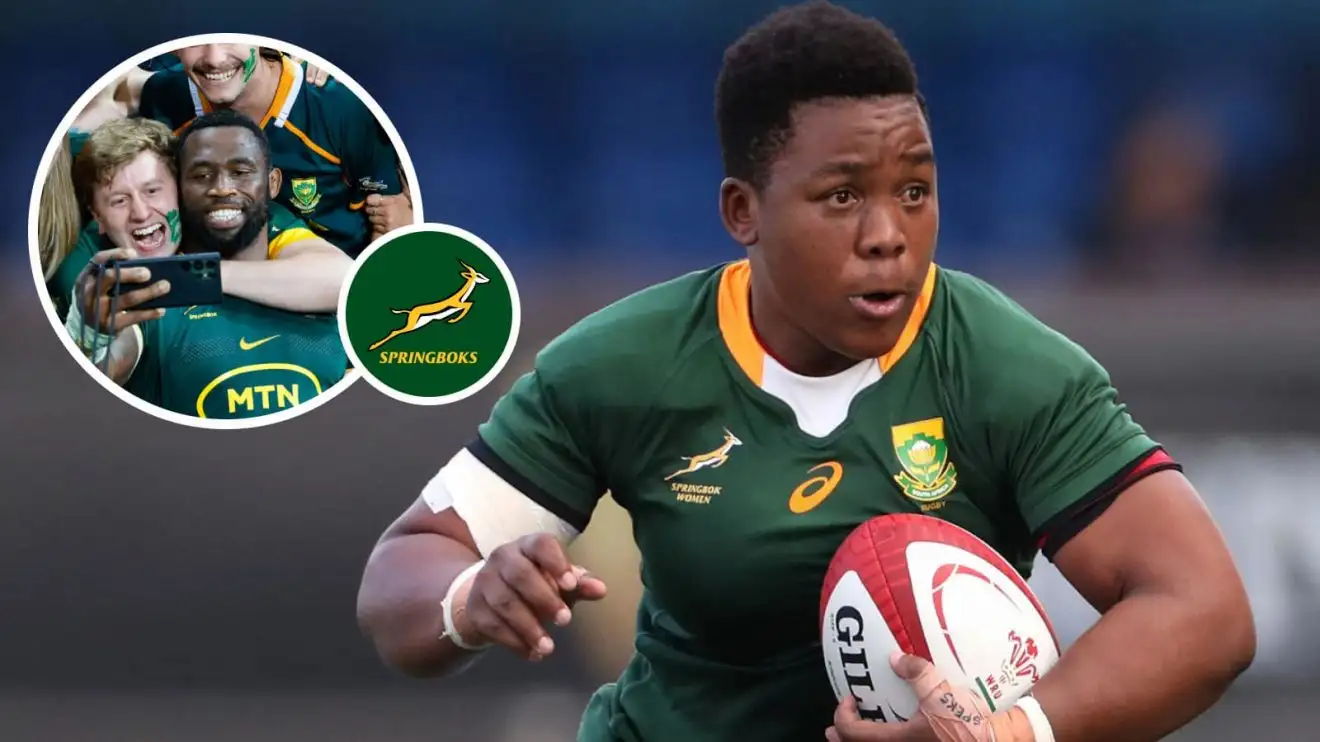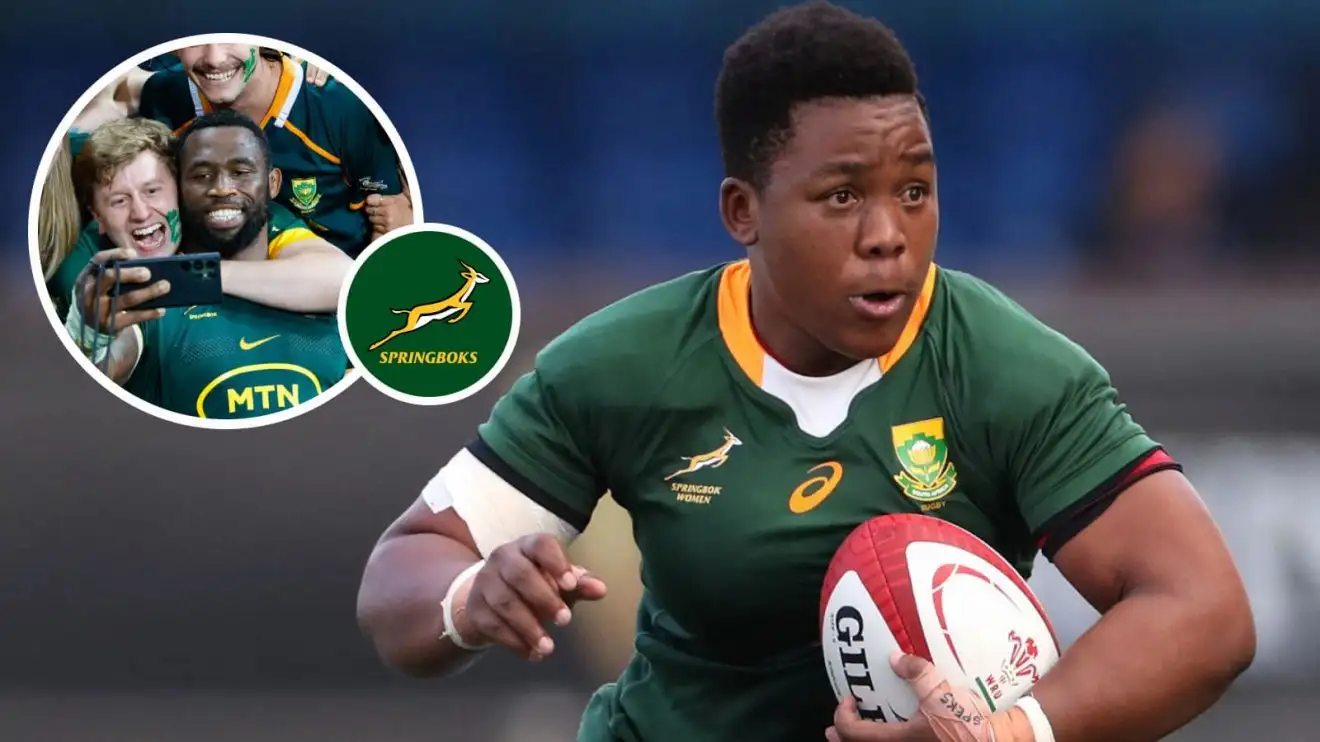
South Africa women’s prop Babalwa Latsha talks exclusively to Planet Rugby.
The story of South Africa captain Siya Kolisi and his rags to riches rise from abject poverty might never be matched.
The township boy, so hungry he cried out in pain at night, who grew up to lead his nation to back-to-back Rugby World Cups.
Brought up by his paternal grandmother, with only a brick to call a toy, Kolisi emerged to become the global icon and figure of inspiration we know today.
Yet in another sprawling township, some 500 miles across from Zwide in the Western Cape, was another Springbok captain of the future also fighting to survive.
Babalwa Latsha has gone on to achieve a degree in law, speak three languages and make history as the first African woman to become a professional rugby player.
In Cape Town this weekend she lines up for South Africa against Australia in tier two of the WXV competition.
Khayelitsha violence
But as a young girl her challenge was to stay out of harm’s way.
“What I experienced growing up in Khayelitsha I wouldn’t want any other young woman to experience,” she tells Planet Rugby.
“My township is a bustling, vibrant community with lots of potential. Unfortunately it’s also notorious for violence against women and children. Crime stats are insanely high.
“Rugby came along at just the right time. The field of play became my safest place. It changed the whole course of my life.”
Latsha’s story has yet to make it into film, unlike Rise: The Siya Kolisi Story, which won the audience award at last year’s International Tribeca Film Festival in New York. Don’t bet against it happening.
“Siya and I both come from rather notorious townships,” explains the Harlequins prop. “We’ve conquered odds stacked against us. For me that was growing up where I did as a young woman trying to find herself and her purpose.”
A 2018 report by the Bhekisisa centre for health journalism claimed ‘almost half of Khayelitsha primary school learners have experienced sexual violence’.
In April last year hundreds marched through the neighbourhood in protest at a sex assault on two women in a local church. That followed another reported rape and murder of a 13-year old girl.
“If I think back, it’s really been tough,” Latsha says. “Being a young woman of colour, trying to find yourself.
“I think what got me to where I am now was always clinging to hope that there was something better outside of what I was exposed to on a daily basis.”
The day hope arrived for her she remembers well. It was when the Vuka programme, set up by the South African Rugby Legends Association to promote rugby in disadvantaged communities where the game was not played, came to town.
“I felt empowered, I felt liberated, I felt I belonged somewhere,” she recalls. “I was normal. My physique was normal.
“I was surrounded by women who were incredibly talented and who too embraced their physicality and their appearance.”
The challenges did not just melt away. “As a woman who plays rugby, a male-dominated sport, you have to believe in yourself because you are most likely to be ridiculed for one reason or another,” she admitted to the Vuk’uzenzele newspaper in 2020.
Latsha withstood the insults and gender stereotypes and rugby allowed her not only “to dream beyond” her circumstances but to dedicate herself to helping transform the lives of countless others.
She now divides her time between playing and serving as director of the Beast Foundation, set up by Boks legend Tendai Mtawarira to assist young people build a future with access to sports training, skills development and education opportunities.
She is also director for the MENstruation Foundation, whose mission is to end period poverty and empower women through awareness, and sits on the board of O Grand Land, a non-profit organisation working with at-risk women leaving South Africa’s care system.
‘Dream in the way we did’
“My hope is that both my and Siya’s life stories are an indication of what is possible,” Latsha adds.
“We want to be positive points of reference to instil and give hope to young people that they too are able and should dream in the way we did.”
Kolisi’s example is never far from her thoughts. And not just because she considers him the greatest Springbok captain of all time.
“His ability to unite our country in a way that has almost never been seen before still inspires me,” she says. “It gives me added strength to blaze my own trail and pave the way, hopefully, for generations to come.
“My biggest dream is to see a society where young women can grow up safely, freely and confidently – where young boys and girls see themselves as equal.
“So we can ultimately and finally foster a society that does not see women as lesser than, but sees them for who they truly are.”
This won’t happen overnight and the Springbok Women are on a different trajectory to the men, who last weekend added the Rugby Championship to their world crown. They rank 11th and have yet to finish inside the top-10 at a World Cup.
But registered female club players in the country are up by 108 per cent since 2019, from 3,259 to 6,801, with a 41% rise in female senior school participants. Change is coming.
“The current generation of young people here in our society and in our communities is ambitious,” Latsha confirms. “The young men and women are positive agents of change. They are taking up challenges, actually wanting to improve our communities.
“So I can never agree when someone says that things will always be the same. For as long as I am around, people like Siya and the Springbok men and women teams, it will never stay the same.”
